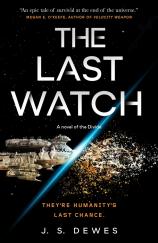The Last Watch: A Novel of the Divide
Review
The Last Watch: A Novel of the Divide
THE LAST WATCH manages to entertain with some interesting ideas that pull from fan-favorite tropes of space operas. With an offering of pulpy thrills and wit throughout, this introduction to J.S. Dewes’ sci-fi trilogy finds its readers as the tension builds.
At the edge of the universe is the Argus, a ship that houses a crew meant to watch over the Divide. They already have a reputation as convicted military personnel, sent to this sect as a disciplinary action, similar to the Night’s Watch from Game of Thrones.
Cavalon Mercer is secret and schooled royalty who has been sent to work on the Argus for unknown reasons. Something he did in his past has led him there, and he keeps this secret close to his chest. Adequin Rake, the captain of the Argus, believes she’s in a role that she has no right to wield. Her constant inner struggle about her own inadequacies as a leader keeps her grounded and relatable.
The Divide is a mysterious sort of wall at the edge of the universe. Hundreds of years ago, it’s assumed that alien fleets known as the Viator came through the Divide to wage war on the people of our universe. None of the expeditions sent into the Divide have ever returned. Now, the Argus begins drifting ever closer to it, and help isn’t on the way. Either something is pulling them in, or the Divide itself is growing, and all life in the universe could be in danger.
"Dewes’ voice is playful and easy to follow. It’s nice to read a debut novel that’s down to earth in its approach to prose; though pulpy and quick at times, it’s never overly romantic or chaotic."
Adequin must worry about saving her crew, Cavalon must find a way to help them and possibly clear his name, and the whole crew will have to figure out how to stop the Divide while they still can. This means gaining the trust of the military that abandoned them in the first place.
The story remarks on a few major challenges we face in society, but adds to them a scale of heightened action for the main characters to grapple with. It’s an interesting problem to have them speak from the perspective of the military, especially when they’re granted more information than any outside point of view. This hasn’t yet been taken to its furthest point of reflection, so the ramifications of a military force having all the cards is a theme that I hope will be fleshed out later in the series. What does it mean for a sect of the military to be designated a timeout, and what consequences are in store when they are the only ones privy to vital information that will impact the safety of the universe?
Most of the time, the characters face a mind-boggling crisis with small-scale resources --- first with the captain having difficulty keeping order, then with the panic that ensues when people don’t recognize the gravity of the trouble they’re facing.
In general, these questions and more have quite a few alignments with climate change. A massive force threatens everyone, but there’s not much opportunity to combat it, even if the people already had the necessary data at their disposal to understand it. At its best, the crew is running out of time to contend with this struggle, which means coming up with hairbrained solutions on the fly.
Dewes’ voice is playful and easy to follow. It’s nice to read a debut novel that’s down to earth in its approach to prose; though pulpy and quick at times, it’s never overly romantic or chaotic. In some ways, the voice reflects the book’s main characters. Like Cavalon, it grows and evolves as the story becomes deeper in nature.
The humor is spot-on throughout, and the timing of these jokes is equally hilarious. Characters express themselves through eccentric dialogue. Jackin, the ship’s engineer, and a few other secondary players often shoot off one-liners and witty banter. The lover is instantly memorable with his awkward disposition, crewmates are recognizable in their roles, and the main characters’ reflections on their missteps as they speak are endearing.
The marketing material for THE LAST WATCH calls it a mix of The Expanse and Game of Thrones. I didn’t quite get that comparison, though there are some parallels. It felt more like a modernized version of “Star Trek” meets TREASURE ISLAND. Most of the time, the book doesn’t take itself too seriously, with pale stakes at the beginning. As the thrill of oncoming danger ramps up, so too does the writing. What begins with a tone of computers talking back with snippy quips and captains throwing around toothbrush janitorial duties as punishments becomes minor political confrontations similar to Lord of the Flies. Since the book generally keeps this tone, it seems meant for a reader who is not in for a serious ride, but rather would like to chill with age-old sci-fi tropes and a likable cast of characters.
Cavalon, who starts out snarky and pompous in his own endearing way, needs to grow up and take some responsibility for his actions. Adequin must gain some faith in herself, and quickly, so she can properly lead her crew. The people around them are all faced with the consequences of panicked actions that haven’t been thought through. The mysteries dominate quite a bit of the story, but the answers they deliver either manage to meet readers’ expectations or keep them invested in future installments.
Reviewed by Austin Ruh on April 30, 2021
The Last Watch: A Novel of the Divide
- Publication Date: April 20, 2021
- Genres: Adventure, Fiction, Science Fiction
- Paperback: 480 pages
- Publisher: Tor Books
- ISBN-10: 1250236347
- ISBN-13: 9781250236340










